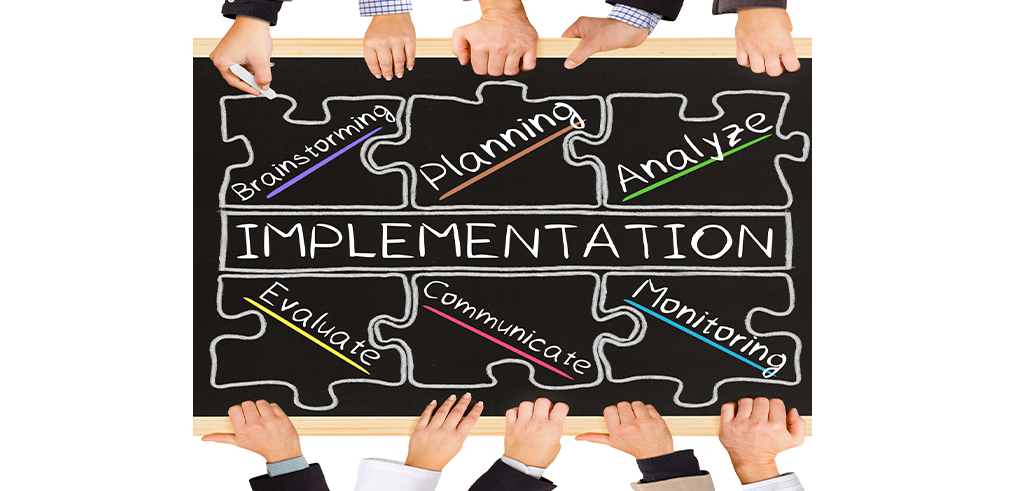So, you’re looking to implement a new CRM? The decision to invest in your company’s technology solutions is always an exciting one. While a CRM investment will undoubtedly pay off in many ways (increased sales, shortened sales cycle, increased rep productivity, etc.), there are many things to consider to ensure a successful implementation.
With many products on the market, you’ll need to invest substantial energy in finding the system or service that best meets your needs. Most importantly, you’ll need a bullet-proof plan for bringing your team along; sales management and sales reps will make or break your investment.
In this article – whether you’re in Sales Operations, Sales Management, or a Sales Rep – we examine what you should consider when making a CRM investment to ensure that each arm of the sales team is set-up for success.
Sales Operations: How To Determine The Right Fit

Business needs
Depending on the size and maturity of your business, your industry, and existing processes and systems, your CRM needs will differ.
While simpler business models may only require a basic system that auto-responds to potential customers signing up for an email subscription, more mature and complex businesses will require a robust system that integrates important processes like marketing automation, contact and lead management, point of sale (POS) functionality, sales reporting, sales process management, employee tracking, and more.
You will need to consider the time and resourcing your organization will need to dedicate to implementation, training, and maintenance. While some systems are simple and well-supported, more custom CRM implementations require entire teams within and/or outside the company to build, maintain, support, and further develop the solution.
Looking toward the future
When choosing a CRM, it’s important to think not only about where your organization is today, but also where your organization is heading. As your organization grows and evolves to meet new customer needs, you will likely need new features and functionality.
As you plan, start by asking yourself where you expect your business to be in one year, three years, five years. Consider what needs you’d have if your customer base grows significantly or if your company expands to serve new audiences or offer additional product lines.
Would your CRM needs change? Would the system you choose today be able to grow with you or would you need to start from scratch?
Reliability and consistency
When looking at different CRM options, do your research to ensure you understand the reputation, pros, and cons of the CRM solutions you are considering. Look at how the CRM provider ensures the solution is stable and reliable.
Keep in mind that your CRM is an important and integral part of your daily business operations. An unstable and under-supported solution can cause major disruption or loss for your business.
Cost
While some CRMs publish pricing directly on their website, make sure you look beyond the obvious platform and service costs. Consider the cost of implementation, consulting and training costs, third-party integration, as well as other opportunity costs.
Return on Investment (ROI)
While investing in a CRM may seem like a no-brainer, you need to consider how you’ll measure ROI to prove value for your organization as well as to help fuel future investment decisions. At the most basic level, you should expect your CRM to help you boost sales and revenue while decreasing the cost of acquiring a new customer.
Measuring increased sales is straightforward. Using your accounting records, you can pull sales and revenue reports for the past three years and compare them with the new reports from your CRM. Measuring decreased acquisition costs will prove to be more complex as you’ll need to look at a variety of costs such as marketing, travel, labor, and more.
Have a plan for what you’ll look at and keep in mind that even if costs stay the same, the cost-per-sale improves with more revenue.
Training and adoption
Consider the investment you’ll need to make in training your staff, process documentation, and driving internal adoption. CRM implementation is not easy. It’s likely that your sales staff will initially see it as an unnecessary new administrative burden, particularly since they won’t see the benefits immediately.
A robust training and adoption plan will be critical to your success. In addition to the end-to-end processes, workflows, and tactical instructions, your training and adoption plan needs to cover how everyone will benefit from using the new system.
What new data will the system provide to help sales reps close more business? How can they use the CRM to automate tasks and get time back? This piece is so important since you’ll only see full benefits with 100% adoption.
Sales Management: Data Driven Decisions

Sales reporting
With a CRM, sales managers and their teams are able to collect and aggregate data about prospects and deals. With dashboards and reports, sales managers get visibility into each sales reps pipelines, deals, and contacts, allowing them to better support and coach the rep for success.
Sales managers can also track each reps progress toward attaining their quotas towards quota attainment, monitor revenue, and see where things may not be moving as expected.
Forecasting
Forecasting is a critical activity for sales managers, allowing them to plan strategically and make informed decisions. CRM allows management to view trends and perform data-driven forecasting with proper pipeline visibility, visibility into which lead sources are proving to be most successful and metrics like year-over-year growth.
Sales manager can use this data to form sales projections for upcoming months and adjust pipeline estimates if needed.
Sales process improvement and adoption
With a single place to track leads, prospects, and customers, sales managers can surface patterns to identify the sales processes that are working well and which ones require improvement.
Sales Reps: Data Input

A CRM is only as good as the data inside of it. A sales leadership and management team will get zero value from the investment if the data is incorrect, inconsistent, or missing.
Focus on the benefits
Too often, while trying to drive adoption, organizations focus on the new tasks and accountabilities for sales reps, forgetting to emphasize the benefits to the reps themselves.
The sales team has worked hard to establish their client relationships and industry networks, which can make some of them a bit reluctant to share their data with the entire office. Demonstrating the benefits is the most important factor to adoption.
It’s important to sell the system as a valuable sales enablement tool and not a way for management to redistribute their accounts or monitor every contact and activity.
For example, sales reps can expect to see a shorter sales cycle due to data accessibility.
Sales reps will benefit from increased insights to their prospects and customers including things like how they interact with marketing efforts or usage and consumption of your products and services. They gain the ability to create and use activity reports and see data that will improve the volume and size of their sales.
Involve your team in the implementation
To make sure your sales reps are on board, consult them through the implementation process. Get their valuable feedback on the features that will help them the most and take the time to understand their pain points so you can design the solution to help.
In addition, get feedback on the usability and design of the system to ensure its intuitive, easy to use and adds value.
Once the system is implemented, make sure you have adequate support in place to aid in the transition, answer questions, and remove any roadblocks that may slow adoption.
Conclusion
Investing in a CRM is highly likely to benefit your organization. In fact, according to Nucleas research, for every dollar spent on CRM solutions, companies experience an $8.71 return on investment.
As you look at options, build a plan and move toward implementation. Keep in mind that having your team on board is critical to a successful data-driven future with CRM.
_____
Questions or comments? Contact SPOTIO at [email protected] or comment below.
SPOTIO is the #1 field sales acceleration and performance management software that will increase revenue, maximize profitability, and boost sales productivity.
Want to see a product demonstration? Click here to see how SPOTIO can take your sales game to the next level.




